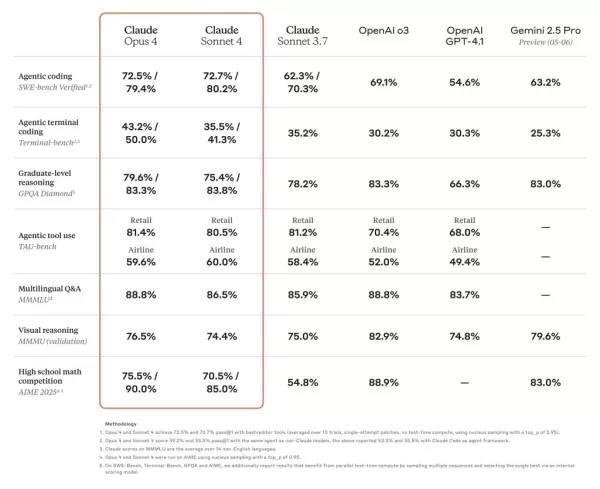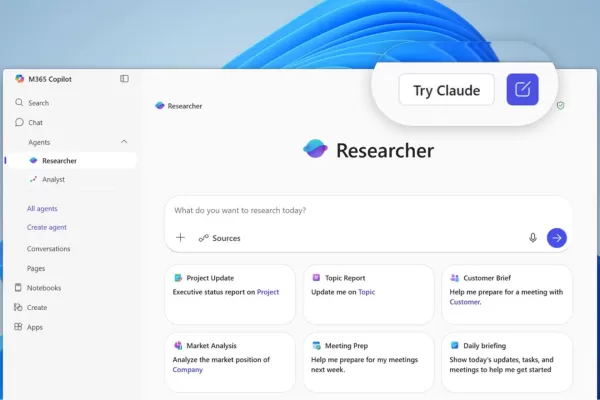Claude 4 Unveiled: Next-Gen AI Models Boost Coding and Agentic Performance
Anthropic has launched its Claude 4 model family, marking a significant advancement for developers crafting cutting-edge AI assistants and coding solutions. The lineup features Claude Opus 4, a top-tier performer, and Claude Sonnet 4, a versatile model for diverse applications.
Anthropic is bold about its goals, emphasizing that these models are designed to "elevate our clients' AI strategies comprehensively." Opus 4 is positioned as a leader in "coding, research, writing, and scientific exploration," while Sonnet 4 is described as a "major upgrade from Sonnet 3.7," delivering "top-tier performance for routine tasks."
Claude Opus 4: The Premier Coding Model
Anthropic touts Claude Opus 4 as its "most advanced model to date and the leading coding model globally," a claim supported by its impressive scores of 72.5% on SWE-bench and 43.2% on Terminal-bench.
Beyond speed, Opus 4 excels in endurance, built for "consistent performance on extended tasks requiring focused effort and thousands of steps." Picture an AI capable of "sustained work over hours"—that’s Anthropic’s promise.
This represents a significant leap from earlier Sonnet models, potentially redefining the scope of AI agents by tackling challenges demanding sustained effort.
Claude Sonnet 4: Versatile AI for Everyday Use
While Opus 4 is the flagship, Claude Sonnet 4 emerges as a dynamic all-purpose model, offering substantial improvements across a wide range of applications. Initial feedback from early users is highly positive.
For example, GitHub notes that "Claude Sonnet 4 excels in agentic scenarios" and is so impressed that they "plan to adopt it as the foundation for the new coding agent in GitHub Copilot." That’s a strong vote of confidence.
Tech analyst Manus praises its "enhanced ability to follow intricate instructions, deliver clear reasoning, and produce polished outputs."
iGent reports that Sonnet 4 "shines in autonomous multi-feature app development, with significantly improved problem-solving and near-zero navigation errors, down from 20%." This is a major win for development workflows.
Sourcegraph sees it as a "significant advancement in software development, maintaining focus longer, grasping problems deeply, and delivering cleaner code."
Augment Code highlights "higher success rates, precise code edits, and meticulous handling of complex tasks," making Sonnet 4 their "preferred primary model."
Hybrid Modes and Developer Tools
A standout feature of the Claude 4 family is its dual-mode capability. Both Opus 4 and Sonnet 4 offer rapid responses for quick tasks and a deeper reasoning mode for complex challenges.
This advanced reasoning mode is included in the Pro, Max, Team, and Enterprise Claude plans. Excitingly, Sonnet 4, with this enhanced reasoning, will also be accessible to free users, broadening access to high-quality AI.
Anthropic is also introducing powerful developer tools via its API to accelerate the development of advanced AI agents:
- Code execution tool: Enables models to run code, unlocking new possibilities for interactive and problem-solving applications.
- MCP connector: Anthropic’s new standard for seamless context exchange between AI assistants and software environments.
- Files API: Simplifies direct file interactions, a critical feature for practical tasks.
- Prompt caching: Allows developers to cache prompts for up to an hour, boosting speed and efficiency for frequent queries.
Top Performance in Real-World Applications
Anthropic highlights that its "Claude 4 models lead on SWE-bench Verified, a benchmark for real-world software engineering tasks." Beyond coding, they excel in "reasoning, multimodal capabilities, and agentic tasks."

Despite these advancements, Anthropic maintains consistent pricing. Claude Opus 4 costs $15 per million input tokens and $75 per million output tokens. Claude Sonnet 4, the more affordable option, is priced at $3 per million input tokens and $15 per million output tokens, a relief for current users.
Both models are available through the Anthropic API, Amazon Bedrock, and Google Cloud’s Vertex AI, enabling global developers and businesses to integrate them seamlessly.
Anthropic is clearly focused on enhancing AI capabilities, particularly in complex coding and autonomous agent tasks. With these models and tools, the potential for innovation has been significantly amplified.
See also: Jony Ive’s OpenAI Device Details Surface
Discover more about AI and big data from industry experts at the AI & Big Data Expo in Amsterdam, California, and London. This event is co-located with the Intelligent Automation Conference, BlockX, Digital Transformation Week, and Cyber Security & Cloud Expo.
Check out other upcoming enterprise technology events and webinars by TechForge here.
Related article
 Microsoft Partners with Anthropic to Boost AI Features in Microsoft 365 Apps
Microsoft is expanding its AI offerings by integrating Anthropic's Claude Sonnet 4 and Claude Opus 4.1 models into Microsoft 365 Copilot starting today. This strategic move diversifies model options beyond OpenAI's offerings, enabling Microsoft custo
Microsoft Partners with Anthropic to Boost AI Features in Microsoft 365 Apps
Microsoft is expanding its AI offerings by integrating Anthropic's Claude Sonnet 4 and Claude Opus 4.1 models into Microsoft 365 Copilot starting today. This strategic move diversifies model options beyond OpenAI's offerings, enabling Microsoft custo
 Perplexity AI’s $34.5B Chrome Bid: Strategic Move or Clever PR Play?
The AI industry was rocked by Perplexity's bold acquisition offer for Chrome, raising eyebrows across Silicon Valley about whether this constitutes legitimate strategy or masterful PR positioning.Unprecedented Acquisition AttemptPerplexity AI stunned
Perplexity AI’s $34.5B Chrome Bid: Strategic Move or Clever PR Play?
The AI industry was rocked by Perplexity's bold acquisition offer for Chrome, raising eyebrows across Silicon Valley about whether this constitutes legitimate strategy or masterful PR positioning.Unprecedented Acquisition AttemptPerplexity AI stunned
 Anthropic imposes stricter rate limits on Claude API, sparking developer backlash
Anthropic revealed today that it's implementing weekly usage caps for Claude subscribers, citing excessive around-the-clock usage primarily tied to its Claude Code platform.The new restrictions, effective August 28th, will complement existing five-ho
Comments (0)
0/200
Anthropic imposes stricter rate limits on Claude API, sparking developer backlash
Anthropic revealed today that it's implementing weekly usage caps for Claude subscribers, citing excessive around-the-clock usage primarily tied to its Claude Code platform.The new restrictions, effective August 28th, will complement existing five-ho
Comments (0)
0/200
Anthropic has launched its Claude 4 model family, marking a significant advancement for developers crafting cutting-edge AI assistants and coding solutions. The lineup features Claude Opus 4, a top-tier performer, and Claude Sonnet 4, a versatile model for diverse applications.
Anthropic is bold about its goals, emphasizing that these models are designed to "elevate our clients' AI strategies comprehensively." Opus 4 is positioned as a leader in "coding, research, writing, and scientific exploration," while Sonnet 4 is described as a "major upgrade from Sonnet 3.7," delivering "top-tier performance for routine tasks."
Claude Opus 4: The Premier Coding Model
Anthropic touts Claude Opus 4 as its "most advanced model to date and the leading coding model globally," a claim supported by its impressive scores of 72.5% on SWE-bench and 43.2% on Terminal-bench.
Beyond speed, Opus 4 excels in endurance, built for "consistent performance on extended tasks requiring focused effort and thousands of steps." Picture an AI capable of "sustained work over hours"—that’s Anthropic’s promise.
This represents a significant leap from earlier Sonnet models, potentially redefining the scope of AI agents by tackling challenges demanding sustained effort.
Claude Sonnet 4: Versatile AI for Everyday Use
While Opus 4 is the flagship, Claude Sonnet 4 emerges as a dynamic all-purpose model, offering substantial improvements across a wide range of applications. Initial feedback from early users is highly positive.
For example, GitHub notes that "Claude Sonnet 4 excels in agentic scenarios" and is so impressed that they "plan to adopt it as the foundation for the new coding agent in GitHub Copilot." That’s a strong vote of confidence.
Tech analyst Manus praises its "enhanced ability to follow intricate instructions, deliver clear reasoning, and produce polished outputs."
iGent reports that Sonnet 4 "shines in autonomous multi-feature app development, with significantly improved problem-solving and near-zero navigation errors, down from 20%." This is a major win for development workflows.
Sourcegraph sees it as a "significant advancement in software development, maintaining focus longer, grasping problems deeply, and delivering cleaner code."
Augment Code highlights "higher success rates, precise code edits, and meticulous handling of complex tasks," making Sonnet 4 their "preferred primary model."
Hybrid Modes and Developer Tools
A standout feature of the Claude 4 family is its dual-mode capability. Both Opus 4 and Sonnet 4 offer rapid responses for quick tasks and a deeper reasoning mode for complex challenges.
This advanced reasoning mode is included in the Pro, Max, Team, and Enterprise Claude plans. Excitingly, Sonnet 4, with this enhanced reasoning, will also be accessible to free users, broadening access to high-quality AI.
Anthropic is also introducing powerful developer tools via its API to accelerate the development of advanced AI agents:
- Code execution tool: Enables models to run code, unlocking new possibilities for interactive and problem-solving applications.
- MCP connector: Anthropic’s new standard for seamless context exchange between AI assistants and software environments.
- Files API: Simplifies direct file interactions, a critical feature for practical tasks.
- Prompt caching: Allows developers to cache prompts for up to an hour, boosting speed and efficiency for frequent queries.
Top Performance in Real-World Applications
Anthropic highlights that its "Claude 4 models lead on SWE-bench Verified, a benchmark for real-world software engineering tasks." Beyond coding, they excel in "reasoning, multimodal capabilities, and agentic tasks."

Despite these advancements, Anthropic maintains consistent pricing. Claude Opus 4 costs $15 per million input tokens and $75 per million output tokens. Claude Sonnet 4, the more affordable option, is priced at $3 per million input tokens and $15 per million output tokens, a relief for current users.
Both models are available through the Anthropic API, Amazon Bedrock, and Google Cloud’s Vertex AI, enabling global developers and businesses to integrate them seamlessly.
Anthropic is clearly focused on enhancing AI capabilities, particularly in complex coding and autonomous agent tasks. With these models and tools, the potential for innovation has been significantly amplified.
See also: Jony Ive’s OpenAI Device Details Surface
Discover more about AI and big data from industry experts at the AI & Big Data Expo in Amsterdam, California, and London. This event is co-located with the Intelligent Automation Conference, BlockX, Digital Transformation Week, and Cyber Security & Cloud Expo.
Check out other upcoming enterprise technology events and webinars by TechForge here.
 Microsoft Partners with Anthropic to Boost AI Features in Microsoft 365 Apps
Microsoft is expanding its AI offerings by integrating Anthropic's Claude Sonnet 4 and Claude Opus 4.1 models into Microsoft 365 Copilot starting today. This strategic move diversifies model options beyond OpenAI's offerings, enabling Microsoft custo
Microsoft Partners with Anthropic to Boost AI Features in Microsoft 365 Apps
Microsoft is expanding its AI offerings by integrating Anthropic's Claude Sonnet 4 and Claude Opus 4.1 models into Microsoft 365 Copilot starting today. This strategic move diversifies model options beyond OpenAI's offerings, enabling Microsoft custo
 Anthropic imposes stricter rate limits on Claude API, sparking developer backlash
Anthropic revealed today that it's implementing weekly usage caps for Claude subscribers, citing excessive around-the-clock usage primarily tied to its Claude Code platform.The new restrictions, effective August 28th, will complement existing five-ho
Anthropic imposes stricter rate limits on Claude API, sparking developer backlash
Anthropic revealed today that it's implementing weekly usage caps for Claude subscribers, citing excessive around-the-clock usage primarily tied to its Claude Code platform.The new restrictions, effective August 28th, will complement existing five-ho





























